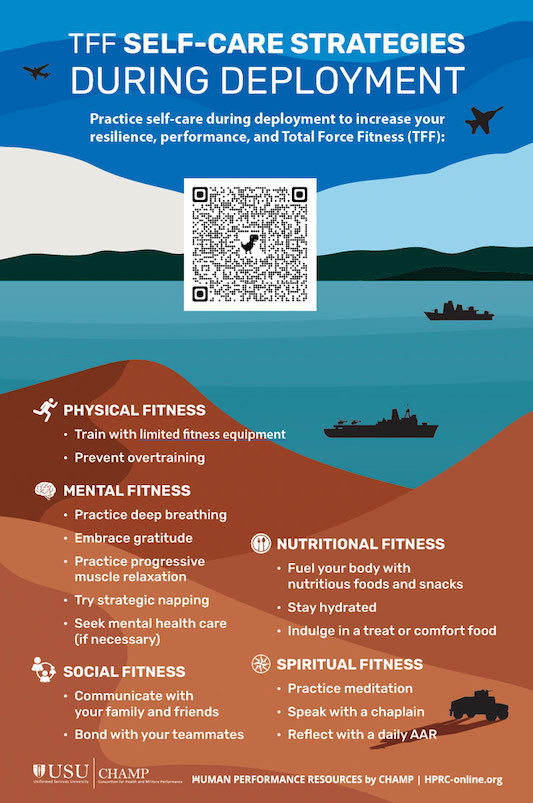Self-care means you take time to intentionally do things that benefit your health, particularly during times of stress. It’s a holistic way to increase your resilience and performance optimization. Since self-care can help prevent burnout and protect against the negative effects of deployment, it’s especially useful during deployment, TDY, and training away from home station Although aspects of deployment and training away from home station are uncertain and uncontrollable, one thing you can control is taking care of yourself.
Individual self-care strategies can be very different. For example, some Service Members might move their bodies as self-care, while others might see rest as self-care. What matters most is that self-care is intentional. HPRC offers deployment self-care strategies you can try that directly relate to Total Force Fitness (TFF).
 Physical fitness
Physical fitness
Many Service Members prioritize physical fitness while on deployment—or when underway for maritime services members—as a self-care strategy. You might need to alter your military fitness routine while on deployment, such as workouts with limited fitness equipment. Avoid overtraining by including recovery days and working to reduce injury risk. Most Service Members medevaced from theater are injured during PT or recreational sports. You can also take a break from daily duties and heavier training by stretching or going for a short walk.
Mental fitness
Meditation, deep breathing, progressive muscle relaxation, and regularly practicing gratitude are self-care activities you can do on deployment to help build your coping skills. To boost your mental fitness, check out HPRC’s resources to help manage stress or cope with deployment. However, these self-care activities are not substitutions for seeking mental health treatment! If needed, make an appointment with your unit’s mental health care provider or a military life consultant.
Sleep is another self-care strategy to boost your mental fitness. Deployment often comes with sleep deprivation. But listening to your body and getting as much sleep as possible to offset fatigue can help you to maintain mental clarity and stay safe performing your duties. Learn how to use strategic napping to help cope with sleep deprivation. Deployment comes with unique sleep challenges, so read HPRC’s strategies to sleep better on deployment.
Social fitness
Connecting with others and focusing on your relationships are other ways to enhance your self-care. If possible, communicate with friends and family to maintain those social ties while you’re away. Or have fun creating new family traditions, such as watching the same movies even though you’re apart. To bond with your teammates, focus on social support during deployment by simply talking with a teammate, expressing gratitude, or asking for help when needed.
Nutritional fitness
Fueling your body with nutritious foods is another self-care tactic. Be sure to build your plate for your performance needs and stay hydrated. You can also pack or ask for care packages that contain non-perishable and nutrient-dense snacks.
While optimal fueling is important, self-care can also include an indulgence or 2. Enjoying a certain treat, such as chocolate, on a particularly tough day might boost your mood. Other comfort foods might also be self-care because they remind you of happy times.
Spiritual fitness
Finally, spiritual self-care is a common practice for deployed Service Members. An excellent source for spiritual self-care during deployment is speaking with a chaplain. If you are interested in building your spiritual fitness but don’t know where to start, you can take this self-assessment and look at these strategies building your spiritual readiness.
Want more self-care resources? Check out these military resources:




